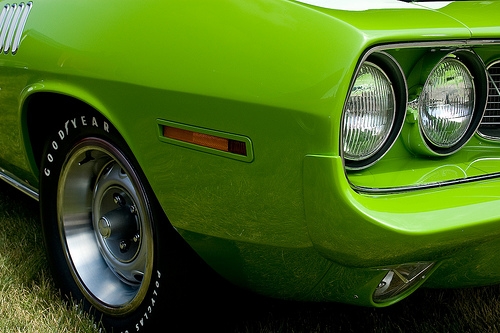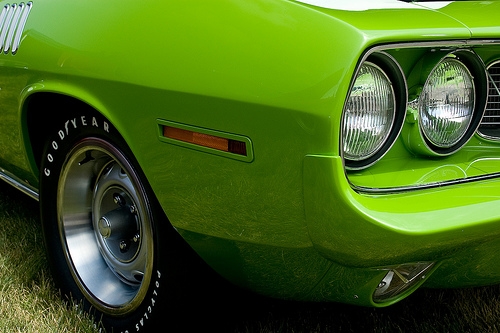Dearest readers,
 Photo: GmanViz via FlickrIn light of the recent oil spill flooding not only the Gulf but also all of our minds here at Grist HQ, I think it’s an apt time to reflect on the larger issue, which is decreasing our dependence on oil. Now obviously one way to do that on an individual level is to go car-free, but I realize that isn’t a viable option for everyone. So for the vehicle-needing among us, I’ve combed through the Ask Umbra archives to extract some tips on making your four-wheeled existence as sustainable as possible.
Photo: GmanViz via FlickrIn light of the recent oil spill flooding not only the Gulf but also all of our minds here at Grist HQ, I think it’s an apt time to reflect on the larger issue, which is decreasing our dependence on oil. Now obviously one way to do that on an individual level is to go car-free, but I realize that isn’t a viable option for everyone. So for the vehicle-needing among us, I’ve combed through the Ask Umbra archives to extract some tips on making your four-wheeled existence as sustainable as possible.
- Vegging out.
Hybrid cars deserve our support, but they rely on gasoline, the supply of which is rapidly dwindling and the extraction of which is wrapped up in nasty world politics and pollution. Ready to one-up the hybrid by converting a diesel to run on straight vegetable oil (SVO)? More power to you, friend. (Not to be confused with biodiesel, SVO is new or filtered chemically unaltered veggie oil, while biodiesel is chemically altered vegetable oil or animal tallow.) SVO conversion kits are readily available and range from about $650 to $1,500 without installation. You also need to have a good mechanic and the willingness to be actively involved with your car. My other advice is to spend time learning what it takes to obtain and process used restaurant oil. My friend takes all the oil produced by a nearby Japanese restaurant, heats it for six hours in an old water heater, removes the resultant water, and then filters the oil until no particles remain that are larger than five microns. He’s a particular kind of fellow, and some will insist that you don’t need to go that far, but again, this is something you should decide for yourself. Get the full Ask Umbra answer.
- Idle wild.
Idling a passenger car is almost always unnecessary, it wastes gas, and it produces myriad air pollutants. Schoolchildren’s mouths are closer to both engine and tailpipe (by virtue of their height, not because they are licking engines), so these polluting emissions enter their sensitive young bodies with ease. Larger diesel engines, such as would be found in a school bus or delivery truck, have the same issues, only diesel fuel is dirtier than gasoline. Now, some folks think that turning off their cars instead of idling for 30 seconds or more will somehow shorten the lives of their vehicles’ starters. Here is a serious refutation of the starter damage myth from the California Energy Commission; some data and resources on school bus idling from the EPA (including curriculum materials); and a short EPA sheet that references the 30-second rule. Another way to look at it is that no reputable source recommends idling. Get the full Ask Umbra answer.
- Cruisin’.
To cruise or not to cruise? Great question. And Edmunds.com, which has suffered the slings and arrows of tedious car testing, says an emphatic yes to putting your car in cruise control. The venerable car group found that using cruise control improved gas mileage by 7 to 14 percent, except in mountainous terrain. Cruise helps with several aspects of fuel efficiency, most particularly (and obviously) when it comes to maintaining one speed and smoothing your ride. Where you set the cruise helps, too. Driving at 50-60 mph keeps fuel consumption down, so if cruise helps you follow the speed limit, then it has an additional benefit (conscience does make cowards of us all).The government has estimated that each 5 mph over 60 costs you 26 cents per gallon. Get the full Ask Umbra answer.
- Sharing is caring.
Car sharing is an organized way to share the burden (environmental, economic, and otherwise) of automobile use with complete strangers. You don’t have to do the organizing: Car-sharing businesses have sprung up around the country and the world. (Some are run by volunteers, in case you like to organize.) The cars are maintained and insured by someone else, and, depending on your locale, may be hybrids. The annual membership fee at one company, Flexcar, is usually about $50 per year. You choose a rate package with usage fees that range from $7 per hour to anywhere from $50 to $700 per month, depending on how much you want to drive. Not so pricey, huh? Even discounting the costs of purchasing a car, making repairs, and filling the tank, I bet you pay the equivalent of a mid-range car-sharing rate for car insurance alone. Get the full Ask Umbra answer.
Slickly,
Umbra



